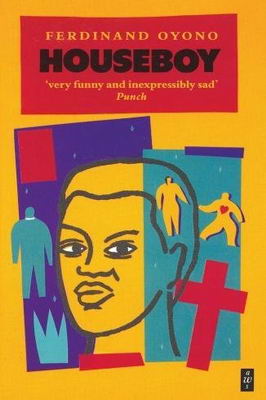Ferdinand Oyono‘s Houseboy written in the first person and in the form of diary entries in two exercise books. It describes the relationship between French colonialists and native Cameroonians during the period of colonization from a Houseboy’s perspectives.
The Houseboy, Toundi, escaped from Cameroon where he was wanted for an alleged crime – a crime he did not commit but has been framed up for his part of spreading the amorous and sexual encounters between his master’s – the local Commandant – wife and the giant Prison Officer, M. Moreau. As a Houseboy, Toundi, saw a lot in the house of his master especially when his master’s wife came to the household. And as innocent as he was couldn’t keep his mouth shut on such issues but went ahead to ask questions pertaining to what he sees and it was these that put him into trouble with his master’s wife and which later led to his death after escaping to Spanish Guinea. For instance, after discovering a condom under the bed of his master’s wife, after she had asked to him to clean the place, the master’s wife got angry and threw him out of the room. This got Toundi shocked. He doesn’t know why a common rubber should make the master’s wife angry so he set out to ask the other workers in the household who told him,
Toundi, will you never learn what a houseboy’s job is? One of these days you’ll be the cause of real trouble. When will you grasp that for the whites, you are only alive to do their work and for no other reason. I am the cook. The white man does not see me except with his stomach. (Page 87)
Innocent as Toundi was and fascinated by the ways of the whites, he kept on asking questions even when Kalisia had told him to leave the household because
… they will never forgive you for that. How can they go on strutting about with a cigarette hanging our of their mouth in front of you – when you know. (Page 100)
When the Germans made the first war on the French his younger brother was killed fighting for the French. When the Germans made the second war on the French his two sons were killed fighting for the Germans. (Page 36)
The above quote shows the extent of the greed and the indecisiveness of natives’ allegiance (note that Cameroon was first ruled by the Germans and then by French). Toundi’s mother even predicted that his greed would lead him to his death.
My mother always used to say what my greediness would bring me to in the end… (Page 4)
From Toundi’s exercise book dairy entries we are told of how Christianity was used to deceive the populace to succumb even though the propagators of the gospel practiced not their preach. They have illicit affairs, drunk, and extort. They arrest innocent civilians, beat them and when they die ask the natives to pray for their souls. Though the French (Europeans) pretended to hate the blacks (natives) and would sit at different places even at church services and use different entrance, they still slept with the natives and hide their deeds from one another.
I know why the Commandant is not like other European men without madams – who send their boys into the location to hire ‘mamie’ for them. I wonder what the commandant’s wife will be like. (Page 46)
Oyono mixes humour and wittiness to explore the complex relations between Europeans and native Cameroonians. For instance, they (Europeans) showed more love for animals and plants than they did to humans.
Next we went to see the goat-park. Madame kept murmuring, ‘Ah how sweet they are! How pretty they are!’ She let them lick her hands. Then she stopped by the bed of roses and hibiscus. She bent down in front of each flower and breathed its scent in deeply. I was on the other side of the flower-bed facing her. She had forgotten I was there. (Page 48)
The perception of Europeans was also made clear from Toundi’s keen observation. We see how each European tries to tell a ‘better’ story that shows how much the ‘African is a child or a fool’. And when the father died in Africa and called him a martyr because he had died in Africa.
They lamented ‘the Martyr’ as they called Father Gilbert because he died on African soil. (Page 52)
The limitation of the story is that we know all these only from Toundi’s opinions. Thus, Toundi’s interpretation of peoples’ actions is all that we know not their own interpretation. This is small book of only 122 pages contains a lot to make one laugh, cry and annoyed. And I would recommend to all. It’s one of those stories you can read right after a very difficult book or you can use prop up a slump in one’s reading.

